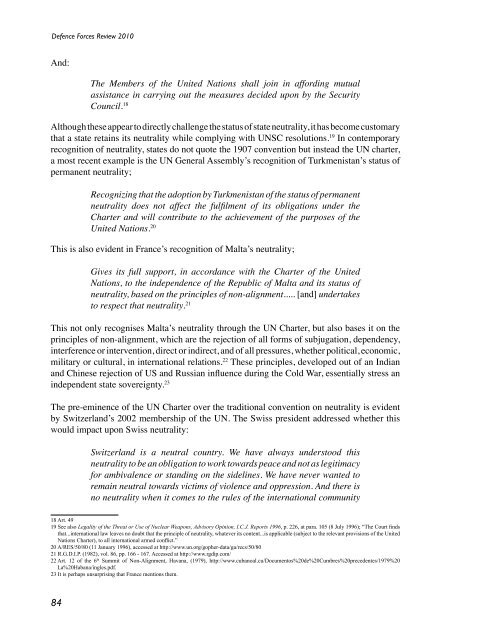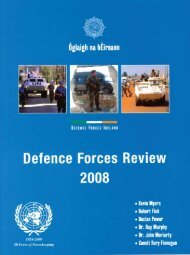Defence Forces Review 2010
Defence Forces Review 2010
Defence Forces Review 2010
Create successful ePaper yourself
Turn your PDF publications into a flip-book with our unique Google optimized e-Paper software.
<strong>Defence</strong> <strong>Forces</strong> <strong>Review</strong> <strong>2010</strong>And:The Members of the United Nations shall join in affording mutualassistance in carrying out the measures decided upon by the SecurityCouncil. 18Although these appear to directly challenge the status of state neutrality, it has become customarythat a state retains its neutrality while complying with UNSC resolutions. 19 In contemporaryrecognition of neutrality, states do not quote the 1907 convention but instead the UN charter,a most recent example is the UN General Assembly’s recognition of Turkmenistan’s status ofpermanent neutrality;Recognizing that the adoption by Turkmenistan of the status of permanentneutrality does not affect the fulfilment of its obligations under theCharter and will contribute to the achievement of the purposes of theUnited Nations. 20This is also evident in France’s recognition of Malta’s neutrality;Gives its full support, in accordance with the Charter of the UnitedNations, to the independence of the Republic of Malta and its status ofneutrality, based on the principles of non-alignment..... [and] undertakesto respect that neutrality. 21This not only recognises Malta’s neutrality through the UN Charter, but also bases it on theprinciples of non-alignment, which are the rejection of all forms of subjugation, dependency,interference or intervention, direct or indirect, and of all pressures, whether political, economic,military or cultural, in international relations. 22 These principles, developed out of an Indianand Chinese rejection of US and Russian influence during the Cold War, essentially stress anindependent state sovereignty. 23The pre-eminence of the UN Charter over the traditional convention on neutrality is evidentby Switzerland’s 2002 membership of the UN. The Swiss president addressed whether thiswould impact upon Swiss neutrality:Switzerland is a neutral country. We have always understood thisneutrality to be an obligation to work towards peace and not as legitimacyfor ambivalence or standing on the sidelines. We have never wanted toremain neutral towards victims of violence and oppression. And there isno neutrality when it comes to the rules of the international community18 Art. 4919 See also Legality of the Threat or Use of Nuclear Weapons, Advisory Opinion, I.C.J. Reports 1996, p. 226, at para. 105 (8 July 1996); “The Court findsthat...international law leaves no doubt that the principle of neutrality, whatever its content...is applicable (subject to the relevant provisions of the UnitedNations Charter), to all international armed conflict.”20 A/RES/50/80 (11 January 1996), accessed at http://www.un.org/gopher-data/ga/recs/50/8021 R.G.D.I.P. (1982), vol. 86, pp. 166 - 167. Accessed at http://www.rgdip.com/22 Art. 12 of the 6 th Summit of Non-Alignment, Havana, (1979), http://www.cubanoal.cu/Documentos%20de%20Cumbres%20precedentes/1979%20La%20Habana/ingles.pdf.23 It is perhaps unsurprising that France mentions them.84
















